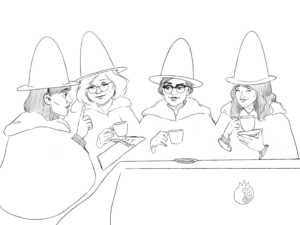The invention of social media opened up a door to a mass influx of painful truths, confessions, and blunders, leading to entire PR teams running around with giant nets to catch their clients in after they, for instance, accidentally leak their hentai tab to the world. As such, politics and internet culture have never meshed cleanly together. As our political strife continues day to day, we ping-pong back and forth between escapism and hunger pangs for the whole ever-changing picture of the political and social hellscape of 2018. Each day is a fresh new battle waged on the mystery of proper, fulfilling self-care.
#MeToo and similar movements have flooded our minds, our art, and our business models. More and more people are going through corporate harassment and inappropriate behavior trainings. Attacks on our heroes can often feel like attack on ourselves, so it only feels natural to flare our defenses when these attacks become too cutting to bear. This protective anger comes from a deeply hurt place.But nevertheless, we cannot separate art from the artist.
In much of our loneliness, we know our media as our friends. Our intimate connection to art is what makes allegations feel like a personal betrayal. Transparent was a really important show to me in my early girlhood, but now I can’t even look at Jeffrey Tambor’s face without feeling sick. His actions are so far removed from me, yet I carry a stabbing personal pain from his disturbing allegations and continued career.
The only healthy option is to step away, but I can’t help but stew at his name and bullshit. When that horrible audio of Jessica Walters, Jason Bateman, and Tony Hale surfaced this summer, I was all up in that. I didn’t need more trauma, but I could not pull away and let the battle end, even though it wasn’t my fight to observe.
It’s easy to get sucked into the ongoing ideological battle within media when that media was your foundation. Like many LGBT kids, I grew up lonely and damaged, with a hard-to-place, insatiable desire for my closeted-yet-still-creative trans girl voice to be heard. So in my youth I gravitated very heavily to the bold personalities of web entertainment. I felt special because I wasn’t watching corporate network television like the rest of my hometown. I was part of the spicy underground content scene, and the person that I very much admired was headlining that late 2000s YouTube era of angry reviewers: Doug Walker, the Nostalgia Critic.
At the time, I saw Doug’s blatant disregard for copyright law as cool, but now I see it as a lazy device of the willfully ignorant content creator. This sleight of hand, his rebellion against the system, reeled in my punk rock self. I watched him from the very beginning of his career as he blossomed from person to brand to an entire movement of online media.
Like many other lonely folk on the internet, I longed to be like Doug. I created my own YouTube personality that was written and performed in his voice, rather than in my own. I modeled myself after him, my speech mannerisms taking from his. I went to film school so I could hone my craft, my whole creative spirit bleeding into work that could catapult me into making web content just like him. When he released his third feature film, To Boldly Flee, I had been stewing in excitement for over a year. Now that I understood what it was like to create something bigger than yourself, I felt such an immense appreciation for his work, but that was only undercut by dreadful disappointment.
To Boldly Flee has a run-time literally longer than Schindler’s List, a film that requires two DVD discs to watch. Worse still, it’s a meta film about the artist vs. his art. At the end, the Nostalgia Critic sacrifices himself and saves the whole fucking planet from imminent doom. This decision to end his webshow in such a high falootin’ fashion was first off, dumb dumb dumb!, and second off, caused the site’s traffic to bomb, putting over thirty different content creators’ livelihoods at risk.
This was a good moment to step back and think about what I was watching and recognize the problematic, misogynist patterns sprinkled across all his work. But instead, I chose to analyze Doug’s self-declared magnum opus to such a depth that even a bad English teacher talking about Ethan Frome would have said Hey, cut that out.
But despite my attachment, it wasn’t surprising when his name was connected to an overwhelmingly large list of allegations many years later. There was no denial within me; I was ready to believe every word, as much as it hurt.
I felt responsible because I had adopted so much of the Nostalgia Critic into who I was. To this day, I still sometimes slip into his voice mannerisms, which had so heavily constructed my ideas of comedy at an early age. I felt angry because I was compromised. I did not want this baggage, and I felt sad because I had to finally give up my hero.
As discussed in Nerd Culture 2.22: You Can (Not) Be Content, it’s scary to look for new art. We tend to stick to what we grew up with, because opening ourselves up to new feelings is risky. But, to knowingly stick with an abusive artist’s work is regressive, not just for the artistic community but for yourself. That indifference validates a culture of powerful, calculating abusers.
The time for civility is done. We cannot avoid talking about politics, because we can no longer pretend we are in a post-racial, post-sexist America. We have been stuck in the same place for a long time now and the only way out is through action. Escapism through media, while a crux of many’s self-care, can be dangerous when crafted by the toxic artist.
If an artist is going to create something with the intention of its being apolitical, that is a political decision; it is a choice that mechanizes the function of escapist art into continuing the status quo, which is unfortunately patriarchal. Choosing to align yourself with a known abuser is a political decision, and one that not only alienates the victims, but establishes a culture where the male artist can get away with just about anything as long as he puts on that show we all wanted to see.
For centuries, art has built a foundation of who we are, and to disavow what has made you is heart-wrenching. But we were born to evolve. We can and will change if we choose to embark on that journey. While bad people can create good and vice versa, this does not erase abuse. A personal nostalgia isn’t enough to justify the lying and manipulation.
Despite the major backlash to The Nostalgia Critic this past May, his victims have moved on after enduring so much of his silence. And that is the precise moment when it is easiest to forgive the perpetrator. But when a rich white man like the Nostalgia Critic goes into exile (in his big fancy house), it is more of a vacation in luxury. He has no need to come to terms with what he is done because all he needs to do for his redemption is to wait until people forget how angry they were and are in need of a good laugh.
Harvey Weinstein got out on bail despite everything. Jeffrey Tambor is still getting acting jobs and has even received support from Transparent show creator, Jill Soloway. Louis CK got a standing ovation at his comeback stand-up performance. Donald Trump is still President.
None of this is surprising, as much as we’d like it to be, and that’s scary. We can’t take down historic monsters like Trump on our own, but we do have the power to independently take small steps. Like with the Nostalgia Critic, I have to change the channel, because no matter what he did for me once, it is now an illusion. The good news is that for every shithead there are ten other great talents out there working just as hard — harder. We must rise above.
While my speech patterns still contain traces of that shrieking internet titan who rocked my world, I can still redirect those patterns into my own. Confronted by the abuse cycles of our heroes, it’s easier to see our own patterns.
Throughout our lives, our circumstances may change, but we often fight the same battles. These patterns manifest themselves in many ways: be it as specific conflicts with people we meet, or struggles that we have at difficult jobs. For instance, you can lose a friend one day and find a new friend, only to lose them the same way a year later. Each time our vice overtakes us, we ache both from the personal failing and from the damage we have done. It’s embarrassing to keep losing the same battle, especially when destroyed friendships are the collateral.
One of the ironies of happiness is that to find it, we must often take on pain. Only by truly looking within can we find the root of our problems, and work beyond them. To parse our patterns and spirals into the story arcs that make a narrative is difficult, but very necessary. While it may feel like some sort of self-flagellation or regression to so analytically dissect ourselves, that is the long game of healing. I say all of this because to let go of the art that helped create you because of abuse that has not touched you is truly difficult. Artists provide us with comfort, a sense of comradery that helps us not be alone.
But the art that comes from an abuser should not be celebrated; just because we didn’t see the horror behind the scenes that transpired to create the work doesn’t mean we can ignore it. Like this kind of healing, it’s important to acknowledge the transgressions of the toxic artists and how they might be poisoning you, and to move on.
As our nation descends deeper and deeper into peril with few signs of stopping, we lose our privilege to remain silent. While no one wants to be cast as the villain, to stay at the side of an abuser, regardless of personal connection, is to act as their enabler.
It hurts to let go, it hurts to let our identities be fractured by the misdeeds of strangers, and it hurts to take all that in and change course. It’s like walking the tightrope without a net. But it is necessary. There is so much more out there to be found, and you have the boundless power to change the channel and rebuild.
As a transwoman capable of scripting her own one-woman show for every weekly therapy session, I’ve been rebuilding and restructuring each and every hour for the past year and a half. It’s a motif that’s dear to my heart, hence why I have written three parts to this series with the same overarching theme.
If you have been damaged like I have, remember that it takes time but eventually you will find courage that you never believed possible. You’ll fall down a few times, but it’s okay. You’ll learn from it and move forward just like you did when you started this journey.


